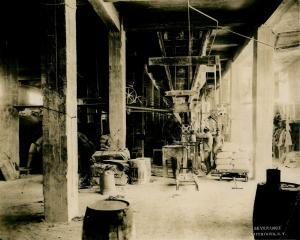 Armco Asbestos Surveys
Armco Asbestos Surveys
Last Updated on 16th September 2019 by
Larry Evans started work at an asbestos talc mine, the Carbola Chemical Company in Natural Bridge, when he left school at the age of sixteen.
Carbola Chemical Company mined talc and processed it on a site near the village where he lived, just north of New York.
A lot of Larry’s neighbors, friends, and family members also worked there at the mine, including his father and two sisters.
It was only a small village with 300-500 people living there, with around 100 of them employed at the Carbola mine.
Asbestos talc was mined onsite from a 600-foot shaft with six levels.
The talc was also broken up, ground into powder, and then made into various products.
Products they made included plant food, cement paint, disinfectants etc.
Larry began work in the ‘Specialty Department’ alongside his father who worked as a mixer-man, where he would mix the powdered talc with different chemicals to make a range of products.
Larry would then bag, label and ship the products by rail.

Talc itself is said to be not poisonous, although tremolite, one type of asbestos is, and is often co-located with talc deposits.
Long before this link was established by medical professionals, workers were being exposed to tremolite by working with talc.
Workers such as Larry, his father and sisters at the Carbola Chemical Company.
Whilst Larry worked at the mine over the course of six years, he recalls there being no safety precautions taken such as wearing respirators or protective clothing.
All that did happen was an annual chest x-ray of all workers.
There used to be lots of talc mines in Northern New York throughout the 19th and 20th centuries, and as a result, there is a really high rate of mesothelioma in the area.
Mesothelioma cancer is directly linked to asbestos exposure.
Over the years, most of the talc mines have closed down, but despite this, mesothelioma death rates remain high due to the long incubation period of the cancer before it develops.
Although Larry is in relatively good health for his age, he still suffers from some spots on his lungs casued by working at the asbestos talc mine when he was young.
He says, “Most of the guys I worked with there aren’t here anymore, they’re all passed away. Most of them passed away from cancer of some form or another.”
With age, he realises he shouldn’t have taken the job, but he was young and needed the money.
“Put it this way… if I was to have children and they was of working age, I would not recommend them to go there to work.”
He remembers his father not being happy at him working there either.
“He worked there and he didn’t want me to go there… but I went anyway. And he also died of lung cancer, and two of my sisters died of cancer.”
Both his father and sisters died in their fifties and sixties, so were relatively young.
All due to asbestos exposure.

Amazingly, 75 year old Larry is alive and well today, and thankfully cancer free.
Perhaps this is because he only worked at Carbola Carbon Company for six years up until 1964.
When he left the asbestos talc mine, he went to work for Niagara Mohawk as a mechanic doing tree preservation.
After meeting his wife and getting married, he then went to work at Newton Falls Paper Mill, in Harrisville where the pay and working conditions were very good.
He worked at the paper mill for thirty years before his retirement.
Today, Larry is retired and still lives in Harrisville, where he has lived and worked for over the last 30 years with his wife and family.
Source of article:- www.northcountrypublicradio.org/news/story/34966/20171113/north-country-at-work-the-hazards-of-working-in-the-natural-bridge-talc-mine
Did you enjoy our article on Hazards of working in asbestos talc mine in 1950s? Then check out our latest posts below.
So make sure you contact our Armco office to arrange an asbestos survey, before it’s too late!
Whether you need an asbestos management survey, or a refurbishment/ demolition survey, contact us on 0161 763 3727 or by visiting https://www.armco.org.uk/
Finally, for all your asbestos training needs call 0161 761 4424 or visit https://www.armcoasbestostraining.co.uk/to book an asbestos awareness training course.
Published Jun 28, 2018